Creation Care
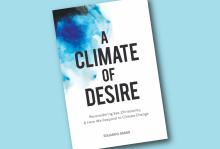
IF YOU’RE LIKE me, your first response to the title of Eduardo Sasso’s book was “What?!” But, as unusual as the pairing of climate change and sex is, Sasso proves that their association is fitting. A Climate of Desire argues that the challenge of today’s climate crisis is ultimately not about technology, science, or political will. Rather, like sex, it’s “about desire: about what we long for and about the consequences of our longings.”
Our longings have always been ripe for co-optation. Sasso’s book shows how, throughout history, from the tower of Babel to the tech frontier of modern California, people have been tempted to forsake their God-given humanity for an artificial substitute. Our problem today, though, is that our refusal to learn from the past comes with an exorbitant price tag. Fossil fuels have enabled the unrestrained indulgence of our misplaced desires, transforming our cities into engines of unprecedented ecological devastation.
In A Climate of Desire, Sasso reminds us that the Spirit-inspired imagination of ancient truth-tellers such as Jeremiah, Ezekiel, and Jesus himself has a great deal to offer us in our current predicament. Calling their contemporaries to repentance, these holy dreamers denounced the harlotry of cities and nations that were running after false gods of wealth and power. They proclaimed visions of the holy that bordered on the psychedelic and grasped that at the heart of injustice and violence is misplaced desire.
Sasso finds tremendous strength in these ancient voices. But he also gains inspiration from recent campaigns for civil rights and contemporary initiatives for ecological renewal, such as the Transition Network and the fossil-free divestment movement.
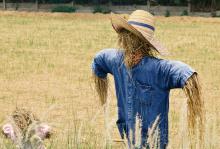
THERE ARE SEVERAL good and interesting arguments to be had about climate change: Should we tax carbon? How much? Concentrate on electric cars or on public transit? How best to reduce the factory farming that creates so many emissions? Dealing with this crisis will involve the biggest and most rapid transition in economic history, so it would be strange if there weren’t debates about how to proceed.
But one debate not to have is: Is global warming real? By now it’s entirely obvious that the scientists are basically right—that’s why there’s half as much ice in the Arctic as when they started warning us, and half as many coral reefs. Donald Trump aside (there’s a nice thought), this one is so clear even the oil companies don’t dispute it, though of course they try to delay and minimize the need for real change.
Deprived of that point of contention, those who want to disrupt the push for climate action fall back on two particularly dumb straw-man arguments, which are worth engaging just long enough to dispose of.
One is that climate activists want to “turn off fossil fuels tomorrow.” You hear this from oil companies, but you also hear it from liberal politicians who don’t want to take strong action against oil companies. When local environmental justice groups, for instance, asked then-California Gov. Jerry Brown to stop permitting new oil wells next to their schools and homes, he responded with roughly the sensitivity and candor of Oklahoma’s climate-denying Sen. Jim Inhofe. Environmentalists, he said, wanted him to “snap my fingers and eliminate all gasoline in all California gasoline stations.” And if he did that, he said, “What would happen? Revolution? Killings? Shootings?”
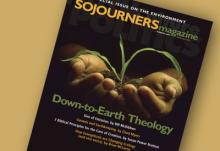
PEOPLE WHO are sensitive to creation know that creation is in constant flux. Continents drift, climates change, magnetic poles flip-flop, and bogs gradually give way to wet meadows and then various kinds of forests. There’s a natural succession out here under the sun, and I think there’s a kind of natural succession going on theologically for many Christians as well. ...
First, increased concern for the poor and oppressed leads to increased concern for all of creation. The same forces that hurt widows and orphans, minorities and women, children and the elderly also hurt the songbirds and trout, the ferns and old growth forests: greed, impatience, selfishness, arrogance, hurry, anger, competition, irreverence—plus a spirituality that cares for souls but neglects bodies, that prepares for eternity in heaven but abandons history on earth. ...
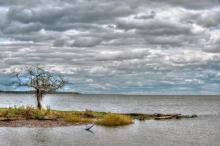
Stormwater pollution is the fastest growing source of pollution in the Chesapeake Bay watershed—a 64,000 square mile drainage basin that sprawls across parts of Virginia, Maryland, Delaware, West Virginia, New York, and Washington, D.C. One of the contributors: religious congregations.

The United Nations climate negotiations in Katowice, Poland — the follow-up to the blockbuster 2015 Paris conference — came to a dramatic close on Dec. 15 with the adoption of the "Katowice Climate Package." The package represents significant progress on global climate action and will allow nations to move forward in setting and meeting greenhouse gas emissions reduction targets over the next five years. However, the roadmap will need major improvements to reach the level of “ambition” the scientific community says is needed to protect the most vulnerable.

A dystopian scene is unfolding across California. Charred car skeletons sit idle on the side of roads in the working-class town of Paradise, Calif. In one video, a camera pans to reveal what looks like an apocalyptic movie set — passing the remains of an abandoned school bus, begging us to ask what happened to those who were inside.

O God, as the prophet proclaimed long ago,
You care for your earth and your gifts overflow.
Though sin leads to things that disrupt and destroy,
You work to redeem and to bring life and joy.

As a civil rights activist from the civil rights movement of the ‘60s, I continue to believe that everyone has constitutional rights. Thousands of Americans are being denied their civil and human rights because insensitive or politically manipulated legislators are creating policies that are destroying the environment. When profits, rather than the well-being of human and environmental life, determine the survival of the planet, it is a civil rights issue.
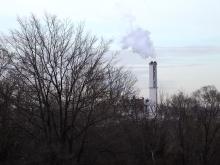
This weekend, more than 80 faith communities in Maryland will lift up climate justice as part of the fourth annual “Climate in the Pulpits / on the Bimah / in the Minbar” event. Jointly organized by Interfaith Power & Light (DC.MD.NoVa) and the Chesapeake Climate Action Network, the event is a multi-faith effort to carry the message of creation care from the pews to policy makers.

A desire to care for the environment also stems from the Christian traditions of compassion and love. Congregations have long worked to alleviate hunger, lift the poor and the vulnerable, and comfort the sick. Creating community gardens, making energy more affordable, and working to avoid the worst effects of climate change, which are disproportionately felt by low-income communities, stem from these traditions.
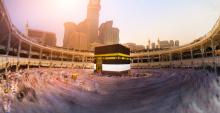
Catovic, 53, is an American Muslim of Bosnian-Anglo descent who lives in New Jersey and serves as the senior Islamic advisor to GreenFaith, an interfaith coalition for environmental issues. He believes the responsibility of fighting climate change begins with the individual, but stresses that the Green Hajj is “not just about the more privileged parts of the Western World. I am just one person who is making this commitment. There are many other millions of people who are doing this too.”
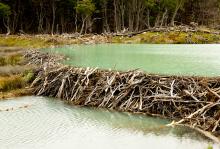
IN THE REMARKABLE speech that God delivers beginning in Job 38—God’s longest soliloquy in the Bible, Old Testament or New—we hear of the mountain goat, the raven, the lioness, even the wonderfully silly ostrich, redeemed by her wild speed. But nothing of the beaver! Doubtless this is because Job, confined to the old world, had not come across Castor canadensis, and so God did not want to confuse him (Job was freaked out enough already). But if God had been aiming at a North American audience, there is no doubt the beaver would have starred in the account, because there may be no finer creature under heaven.

THOSE BEARING witness at Standing Rock have become some of the most important, and most prophetic, leaders protecting God’s earth in America today—especially given the threat to our environment that Donald Trump represents.
There is no better example of what the struggle to protect God’s creation looks like now, and may look like in the future, than the “water protectors” at Standing Rock, who have put their bodies on the line for months to stop the Dakota Access pipeline from being built on sacred tribal lands and endangering the water supply of Indigenous people. Native Americans have been joined by people of every color and creed, including clergy (see “A Chorus of Resistance” in this issue) and military veterans, to prevent the construction from moving forward, despite brutal attacks from private security forces and state law enforcement.
The decision by the Army Corp of Engineers in early December to deny an easement for the pipeline route across Lake Oahe on the Missouri River, adjacent to the Standing Rock reservation, will temporarily halt the construction. But the head of the company building the pipeline has been a major contributor to Trump’s campaign, and with perhaps the most anti-environment president in memory about to enter office, the struggle is far from over.
“It is a temporary victory,” Denise McKay, a member of the Standing Rock Sioux told the Washington Post. “We’ve got to stay put and stay united.” Her daughter, Chelsea Summers, added, “everybody is still here for the long haul.”
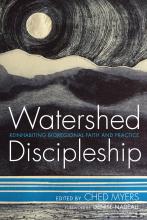
IF YOU'RE LIKE ME, you care about creation, but have a looming gap between your concern and knowing what to do about it. It can be paralyzing to live in an age of global climate change, environmental degradation, pollution, habitat loss, ocean acidification, lead in the drinking water of cities, and the melting of polar ice caps. Many works of ecotheology explain why caring for creation is a Christian imperative but struggle to get to the how.
Enter Watershed Discipleship: Reinhabiting Bioregional Faith and Practice. We can’t easily fathom a plan to care for the entire planet, but we can envision our watershed—the area in which water flows down to a common waterway such as a creek or river. (To find your watershed, enter your zip code on the EPA’s “Surf Your Watershed” site, epa.gov/surf.) Imagine caring for your watershed, along with the network of people who also live there. Ched Myers quotes Wendell Berry’s rewording of the Golden Rule to explain how this is an act of care for the entire planet: “Do unto those downstream as you would have those upstream do unto you.”
In the introduction, activist theologian Myers defines the phrase “watershed discipleship” as a “triple entendre.” It reflects “ a watershed historical moment of crisis, which demands that environmental and social justice and sustainability be integral to everything we do as Christians.” It recognizes a “ a watershed context”—that we follow Jesus in a “bioregional locus.” And “it implies that we need to be disciples of our watersheds”—in other words, “learning from, following, and coming to trust ... ‘The Book of Creation.’”

A coalition of faith leaders took to the steps of the Interior Department April 19 to ask Secretary Ryan Zinke to curb methane leaks at natural gas drilling sites. Notably, the group included a representative from the evangelical community.
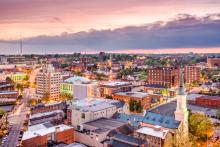
In the past 50 years, the country has made great strides toward equity. But racism is still embedded in every aspect of American culture, from the churches we occupy to the environmental issues shaping our planet. People of faith can tackle these problems by working outside the lines that keep churches racially segregated. One way forward is through collaborating with other church communities on joint environmental projects.
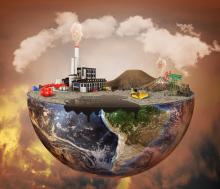
While we look out over creation, we must earnestly ask ourselves how we can participate in communion with the lands surrounding us if there is no clean water to drink, food to eat, or creation in which to delight.

Perhaps climate change’s calamities will galvanize the international political scene, cracking the iron grip of the wealthy on our politics and forcing redistribution of resources. But no matter what happens, people of faith must lead the charge in envisioning a just world for all inhabitants. To slow the destruction of the earth, a fundamental reimagining of our societies is required.

The overall pattern that emerged is that concern about the environment has been flat over the past two decades, and in some cases declined. For example, more Christians prioritized economic growth over protecting the environment in 2015 than they did in 1990.
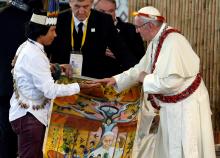
"The native Amazonian peoples have probably never been so threatened on their own lands as they are at present," the pope told a crowd of indigenous people from more than 20 groups including the Harakbut, Esse-ejas, Shipibos, Ashaninkas, and Juni Kuin.